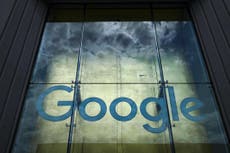Secret campaigns used to pump millions into political advertising during 2019 election, new study finds
Total of 46 different online advertising campaigns were registered during last year’s campaign

Your support helps us to tell the story
From reproductive rights to climate change to Big Tech, The Independent is on the ground when the story is developing. Whether it's investigating the financials of Elon Musk's pro-Trump PAC or producing our latest documentary, 'The A Word', which shines a light on the American women fighting for reproductive rights, we know how important it is to parse out the facts from the messaging.
At such a critical moment in US history, we need reporters on the ground. Your donation allows us to keep sending journalists to speak to both sides of the story.
The Independent is trusted by Americans across the entire political spectrum. And unlike many other quality news outlets, we choose not to lock Americans out of our reporting and analysis with paywalls. We believe quality journalism should be available to everyone, paid for by those who can afford it.
Your support makes all the difference.Secretive “outrider” campaigns with no clear agenda were used to pump millions of pounds of political advertising directly into people's homes during the 2019 election, a new study has found.
Academics studying the election found that official adverts placed by political parties constituted just a “fraction” of the total advertising spend on platforms like Facebook and Google.
Their study identified that a total of 46 different online advertising campaigns were registered during the election campaign, and 64 during 2019 as an election loomed – with many of the supposed groups having “no clear history or longevity”.
Opaque names and lack of a legal requirement for an imprint on the adverts, as is required on physical election leaflets, made it difficult or impossible for people being shown the ads to see who was behind them and what their agenda was. The study found that even where identifying information was required by advertising platforms, it often shed little light on who was behind the campaigns.
A total of 88 UK organisations were registered as “non-party campaign groups” during the 2019 election, placing 13,197 different adverts at a calculated cost of £2.7m.
“It can be difficult for voters to work out who is behind campaign material from a non-party actor,” academics Dr Katharine Dommett from the University of Sheffield and Dr Sam Power from the University of Sussex said.
“Adverts placed by national parties constituted only a fraction of the total campaign spend. Voters are too often kept unaware of who is behind these opaque outfits.”
While some of the 88 groups were established campaigns with known goals, like Momentum, Leave.EU, or Best For Britain, many had little or no presence outside their advertising campaigns, which they spent vast amounts of money on.
Supposedly independent campaigns pushing a political party's message are helpful for that party because election spending limits normally restrict how much advertising parties can produce.
One case study identified by the academics is the case of “3rd Party Ltd”, which was run by an ex-Vote Leave staff member and promoted the Green Party with targeted adverts to voters in marginal seats where it was not competitive.
The academics says this was an “an apparent attempt to split the Labour/Green vote” but that “this information was not clear to advert viewers”.
Later adverts put out by 3rd Party Ltd switched to directly endorsing the Conservative candidate in Conservative marginal or target seats.
Another case study was the “Fair Tax Campaign”, which only ran adverts between 1 November 2019 and 12 December 2019, spending £63,105 on mostly anti-Labour adverts. The study's authors say it is still not clear who was behind this campaign.
The academics recommend new rules that would force here-today-gone-tomorrow campaigns with “no clear history or longevity” to identify themselves using an “imprint” that gave information about who they were. The report was published by the Electoral Reform Society.
The government has said it will reform election advertising rules but not set a timeline for doing so. Cabinet Office minister Chloe Smith said: “This government is already making political campaigning more transparent for voters, with new, world-leading measures that will require campaign content promoted online to explicitly show who is behind it.”
But Dr Sam Power, one of the report's authors, said: “Campaigning online allows people and parties to engage with politics in a new way that is both exciting and necessary. But our legislation should reflect these trends – and our report shows that as it currently stands electoral law is not fit for purpose.“
A cross-party group of senior politicians has also welcomed the report. Dame Cheryl Gillan, Conservative MP and chair of the Venice Commission’s Committee on Political Affairs and Democracy, said: “I welcome this paper as a contribution towards the debate about how we have more transparency in the money spent on campaigning in the electoral process, particularly in the light of the rapidly developing digital world.
“What was actually spent on digital campaigning [in 2019] is far from clear. We must continue to examine how we can ensure we have free and fair elections and what changes are necessary to our laws as technology continues to advance. “
Lord Paul Tyler, the Liberal Democrats’ Lords spokesperson for political and constitutional reform, said: “This could not be more timely. The government are still dragging their feet on vital Codes of Practice, which the Electoral Commission published in July 2019, pulling election campaign spending out into broad daylight. If our citizens cannot rely on complete transparency of funding in elections the whole of our democracy lacks integrity.”
Stephen Kinnock, Labour MP and chair of the APPG on electoral campaigning transparency, said: ”This well-researched and informative new report from the Electoral Reform Society further exposes the extent to which secretive online campaigning continues to threaten our democracy. Voters deserve to know who is targeting them with political advertisements, and must have confidence that the ads are being funded legally. Digital campaigning remains an unregulated wild west, and the government must get to grips with this now.”



Join our commenting forum
Join thought-provoking conversations, follow other Independent readers and see their replies
Comments